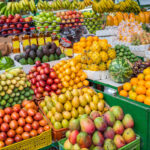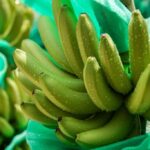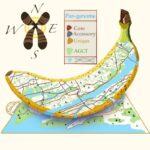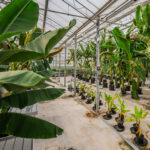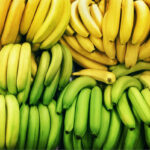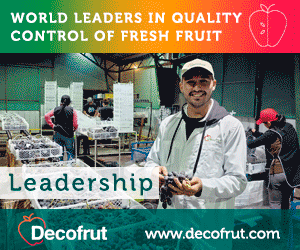China: Goodfarmer to develop produce "multinational" status, says Liu Zijie

This year has been a promising one for Chinese produce company Shandong Goodfarmer, which in addition to selling items such as Ecuadorian bananas and New Zealand kiwifruit more aggressively, is in the process of setting up a Chilean branch. In conversation with www.freshfruitportal.com, the company's president Liu Zijie said he planned to stengthen ties with Latin America.
Liu said the company had dedicated three or four years in its operations in South America, in Peru and Chile in particular, with the latter forming a key part of its strategy in importing crops such as blueberries, cherries and red grapes.

Goodfarmer president Liu Zije.
To reinforce this plan, he said the company was preparing the registration of a new company that will be called Goodfarmer Chile.
"We have the possibility of developing ourselves as a multinational," Liu said.
"We aren't limiting ourselves to locating staff. We are going to conduct a visit to Chile soon to interview key suppliers," he said, emphasizing several objectives in the country that were immediate in nature, such as strengthening collaboration with local providers; especially the big players that produce quality fruit consistently.
"Previously, due to our delay in getting into this field, they weren't familiar with us. But as time goes on, they realize that we have capabilities to successfully sell fruit and that we are a responsible and honest company. We don't have problems with payment."
He emphasized that suppliers always paid a lot of attention to credit, so it was important to gain their confidence by providing sufficient levels of liquidity, highlighting Chiquita Brands International (NYSE: CQB) as one important example.
"In the payment we always have sufficient cash flows. We have paid automatically for some seven or eight years," he said.
And while Goodfarmer continues to import products with the brands of the orchards it sources from, or with the names of exporters, the intention is to develop its own 'Goodfarmer" brand that it hopes will be accepted by some Chilean companies.
"We want to establish a brand like Del Monte and other large companies do," he said.
He said investments will be done "step by step" but without neglecting the possibility of making "more aggressive" investments.
"Up until now we haven't been able to mechanize in the location. That's why we need to invest in factories in Chile, or acquire them. We could even go a step further and invest in orchards, but that wouldn't happen until next year.
"We don't want to do everything ourselves, but through cooperation with local providers. We could buy some shares, 10-20% for example, in exchange for using the Goodfarmer brand on the product."
Goodfarmer's advantages 'not just in China'
The executive said Goodfarmer had unique advantages compared to other companies when it came to its distribution sales channels at home in China and abroad.
"Exports from Chile are numerous at the moment. Normally every shipment is more than a thousand containers. That's why the main channels in China are wholesale, with a little bit of help from electronic commerce [e-commerce]. In this sense, we have an incomparable advantage: marketing," Liu said.
"Maybe Chileans have clients in Hong Kong and Taiwan, as well as continental China. What makes us different to them is the complete distribution network in the domestic [Chinese] market."
Aside from large cities like Beijing, Shanghai and Guangzhou, Goodfarmer also covers second-tier cities like Shenyang.
"We have ripening warehouses and cold storage facilities in cities like Guangzhou and Dongguan. We have a lot of faith in products from Chile and Peru," Liu said, adding the company was in search of land in Shanghai to set up a new facility.
He said the company sold its products through clients across the country, with one of them being well-known online retailer Fruitday.com, and noted it was no secret the Chinese were very demanding in terms of the quality of imported fruit.
"Consumer preferences vary according to the country. The Chinese are very demanding."
He then asked the question, 'what is the risk and challenge that Chilean providers face?'
"They grow too much. Everyone knows that the Chinese only want the best, but what do you do with those [products] that are not so good? There is not such a market in China. That's where Goodfarmer's advantage comes in over other companies...we have a global network.
"In that sense, the clients we have accumulated could be a big help for Chilean and Peruvian suppliers.
"A lot of Chileans don't have a network of clients in the Middle East or India. We can support our value: their products don't just enter the Chinese market, but also in the case that they don't sell well in China, we can help by selling them in the markets that accept them."
Ecuadorian bananas: better than the Philippine competition with a good outlook
In terms of other company updates, Liu said the biggest advance had been in Ecuadorian bananas with volumes increasing exponentially this year, from 10 containers to 70 containers per week during peak periods.
"We are conducting more trade connections with Ecuadorian exporters, and that's why shipments are bigger each time," Liu said.
"At the moment, Ecuadorian bananas have disadvantages in price compared to the domestic one. But due to the better and more stable quality, we haven't seen reduced volumes. Our clients in the retail sector don't find much damage from transit. In that sense I have a good view of Ecuadorian bananas."
Even though Ecuadorian bananas take longer in transport than their Philippine counterparts, Liu said they still had fewer impairments.
"Philippine bananas are inferior to Ecuadorian in terms of quality. The same occurs with shelf life."
Zespri kiwifruit in the spotlight
Liu said his company maintained the second spot in imports of New Zealand, Zespri-branded kiwifruit into China, only beaten by e-commerce platform Tmall. This year, Goodfarmer has a general representation for Zespri in the country's north, and has established a special marketing team for the fruit that has undertaken promotions such as tastings and advertising.
"On last year's base we have strengthened marketing further. In particular, we have formed a new team of 40 staff. We are committed to publicizing Zespri kiwifruit to all homes in the north of China," Liu said, mentioning the brand had a "little bit more" fame in Bejing but there was still much to be done in places like Tianjin, Qingdao, Jinan and Xi'an.
He said the collaboration between the two companies began the year before last, when Goodfarmer was Zespri's distributor in the provinces of Shandong and Henan. This year however, the company covers 'all the markets' of northern China up to the western cities of Xi'an and Urumqi.
"Volumes are currently enormous and increasingly so. Chinese consumers like Zespri kiwifruit a lot. We have dedicated a lot to this product and expect the best because it is one of the company's most important products," Liu added.













